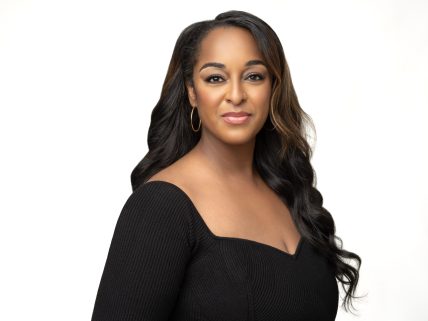We need to talk about being in the ‘sandwich generation’

Taking care of your own kids and responsibilities is hard. Caring for aging parents at the same time is even harder on your paycheck and mental and emotional health. So, how do you remember to see the bigger picture?
The first time I realized my parents were getting older was truly sobering.
My dad had been battling cancer for a while, and as the 30-something only daughter of the family, I’d gotten used to calling my mom for updates on his health – not expecting I had to do much more but pray and send encouragement.
After all, I’d had a baby not too long ago, and my hands were more than full with night feedings, washing clothes, and his dad and I trying to get through the struggle of feeling like sleep-deprived zombies.
But then my mom said something that sounded a little off.
“Do you think one of your friends from college could read the report they uploaded to his MyChart? We don’t really understand it…”
I was stunned. First of all, how was it that the doctors back home weren’t explaining things well enough that my parents were still in the dark? And how bad was it that she was floating random ideas to me about calling friends from college on matters of life and death?
Not to mention, my daddy had started threatening that he wouldn’t move forward with any more chemo treatments (true stubborn dad-style) because he didn’t like being so skinny.
Suddenly, the mental block between “parents” and “kid” broke down in my head – that solid brick wall that had safely gated us throughout life, telling us our parents have it mostly figured out, and our job is to stay in a kid’s place.
“Send me the login, please,” I said right away.
From there it was game on, and I called my homegirl, a radiology oncologist down in Houston to read the report. She told me his progress wasn’t necessarily good and we needed to take some aggressive steps to intervene.
As I started to assess my calendar, juggling how I would get my dad to appointments, work my day job, coordinate with my fiancé to get the baby to daycare, and still run into New York City at night or in the morning to do television, I felt what an estimated 67 million Americans – or 23% of the U.S. adult population – may feel on the regular: the intense pressure of being sandwiched.

The “sandwich generation” refers to adults in their 30s-50s who are managing the responsibilities of caring for dependent children and family, while caregiving for aging parents. We are squeezed on every front, from managing our careers and jobs to the mortgage-level daycare payments we’re making so we are freed up to go to work, or college tuition we’re investing in our children. We cram a pop tart (or don’t eat at all), as we run out the door to get everyone where we need to be and try to remember the things that will keep everyone alive.
Then there’s the emotional toll of watching your parents – people who at one point may have been healthy and vibrant – start to struggle, either with their bodies and/or a changing world, where sometimes technological advancement is too much. There’s grief in so much simultaneous change.
But I’m convinced there’s something about being Black and in the sandwich generation that is uniquely hard, especially if you’re considered successful in any way. Research shows that, ironically, it’s often more well-off or affluent adults making $100,000 or more who find themselves in the sandwich generation, and therefore find themselves relied upon for help.
It’s understood that giving back and helping your family is a must, especially if you were given opportunities that others never got to experience. Sometimes being Black in the sandwich generation means being the first to do a lot of things. It raises the stakes in terms of feeling like you can’t let any of the balls of responsibility that you’re juggling drop. Even if you make six figures, without a huge wealth safety net and the responsibility of kids, you might be one paycheck or two away from having to sell the house and move back home should an emergency hit.
Of course people may say, “No one told you to have kids!” or “Just be thankful you have your parents still with you!” but that assumes we see our responsibilities as burdens and not the blessings they are. It is a blessing to have people to care about in both directions – it’s just the care involved in both directions can be full-time unpaid jobs. According to the Pew Research Center, sandwich generation adults report also feeling more “pressed for time” while also being financially strained.
Sometimes being blessed comes with being stressed.
Once I got my hands on my dad’s care, he was assigned a cancer doctor who happened to be a Black woman, and spoke to him in a way that opened his mind up to more intensive interventions. Due to her coaching, my dad eventually got a stem cell transplant and just this year was announced to be in remission. If it were not for that doctor being a Black woman who spoke to him with compassion and cultural competency, I’m not sure he would have trusted the treatment plan.
When I thought of all the long drives to the hospital, the declined invitations and missed parties or even the ways I had to put pause on pulling certain levers in my career then see my dad healthy, I know it was all worth it. We even grew closer through the time spent together, and he saw his grandson more than he would’ve if we didn’t have doctor’s appointments to go to.
Sometimes being sandwiched means you’re bringing something to a situation that only you can uniquely bring. Our parents don’t always listen (payback!) but they may need what we know. That’s the glass half full – being able to give back to people who, at the very least, gave you a chance at life.
What’s been helping me through this season is finding all the other millennials and Gen X’ers who are in the struggle too. We may feel pressed for time but when we send the check-in text or make a call, it fuels us to keep going. We do the playdates, and share the resources for elder care and suggest organizational tools to keep the trains moving on time.
So to my fellow sandwich generation family, just know that you are not alone. Often your labor will feel invisible or unrecognized. You may not make the Forbes 40 Under 40 or get a big promotion if you’re sucked into the throes of caregiving and parenting. Your boss may not ever know the times you had to get up at 4 a.m. to make all the things happen. You may also have to make tough choices that will knock off what seems like amazing opportunities while trusting that what’s yours will make its way back to you.
Caring for our people is not always about money either, but the spirit in which we play our position. It’s what our kids are watching and what our elders feel.
After I got my first book deal advance, I offered to buy my dad a car to replace the old clunker I’d passed onto him 15 years ago, insisting he deserved an upgrade. He looked at the duct-tape rusty black Mazda with his Army bumper stickers all over the place and shook his head hard.
“Nope. This works fine. I don’t want no new car,” he said sternly. “Use that money for my grandson.”
And there I was, frustrated but grateful, to be back in a kid’s place.

Natasha S. Alford is the Senior Vice President of TheGrio. A recognized journalist, filmmaker and TV personality, Alford is also author of the award-winning book, “American Negra.” (HarperCollins, 2024) Follow her on Twitter and Instagram at @natashasalford.
More must-reads:

